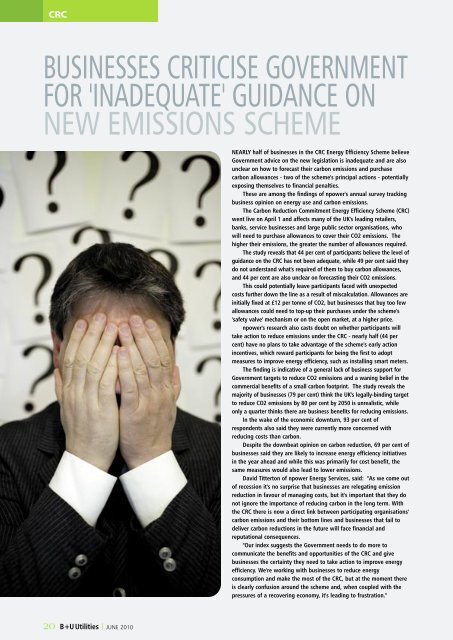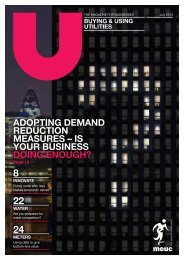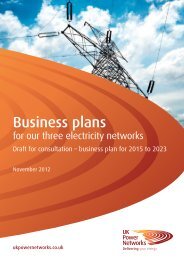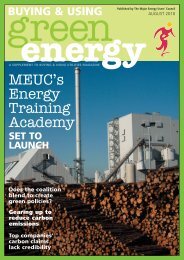CRC - MEUC
CRC - MEUC
CRC - MEUC
Create successful ePaper yourself
Turn your PDF publications into a flip-book with our unique Google optimized e-Paper software.
<strong>CRC</strong><br />
BUSINESSES CRITICISE GOVERNMENT<br />
FOR 'INADEQUATE' GUIDANCE ON<br />
NEW EMISSIONS SCHEME<br />
20 B+U Utilities | JUNE 2010<br />
NEARLY half of businesses in the <strong>CRC</strong> Energy Efficiency Scheme believe<br />
Government advice on the new legislation is inadequate and are also<br />
unclear on how to forecast their carbon emissions and purchase<br />
carbon allowances - two of the scheme's principal actions - potentially<br />
exposing themselves to financial penalties.<br />
These are among the findings of npower's annual survey tracking<br />
business opinion on energy use and carbon emissions.<br />
The Carbon Reduction Commitment Energy Efficiency Scheme (<strong>CRC</strong>)<br />
went live on April 1 and affects many of the UK's leading retailers,<br />
banks, service businesses and large public sector organisations, who<br />
will need to purchase allowances to cover their CO2 emissions. The<br />
higher their emissions, the greater the number of allowances required.<br />
The study reveals that 44 per cent of participants believe the level of<br />
guidance on the <strong>CRC</strong> has not been adequate, while 49 per cent said they<br />
do not understand what's required of them to buy carbon allowances,<br />
and 44 per cent are also unclear on forecasting their CO2 emissions.<br />
This could potentially leave participants faced with unexpected<br />
costs further down the line as a result of miscalculation. Allowances are<br />
initially fixed at £12 per tonne of CO2, but businesses that buy too few<br />
allowances could need to top-up their purchases under the scheme's<br />
'safety valve' mechanism or on the open market, at a higher price.<br />
npower's research also casts doubt on whether participants will<br />
take action to reduce emissions under the <strong>CRC</strong> - nearly half (44 per<br />
cent) have no plans to take advantage of the scheme's early action<br />
incentives, which reward participants for being the first to adopt<br />
measures to improve energy efficiency, such as installing smart meters.<br />
The finding is indicative of a general lack of business support for<br />
Government targets to reduce CO2 emissions and a waning belief in the<br />
commercial benefits of a small carbon footprint. The study reveals the<br />
majority of businesses (79 per cent) think the UK's legally-binding target<br />
to reduce CO2 emissions by 80 per cent by 2050 is unrealistic, while<br />
only a quarter thinks there are business benefits for reducing emissions.<br />
In the wake of the economic downturn, 93 per cent of<br />
respondents also said they were currently more concerned with<br />
reducing costs than carbon.<br />
Despite the downbeat opinion on carbon reduction, 69 per cent of<br />
businesses said they are likely to increase energy efficiency initiatives<br />
in the year ahead and while this was primarily for cost benefit, the<br />
same measures would also lead to lower emissions.<br />
David Titterton of npower Energy Services, said: "As we come out<br />
of recession it's no surprise that businesses are relegating emission<br />
reduction in favour of managing costs, but it's important that they do<br />
not ignore the importance of reducing carbon in the long term. With<br />
the <strong>CRC</strong> there is now a direct link between participating organisations'<br />
carbon emissions and their bottom lines and businesses that fail to<br />
deliver carbon reductions in the future will face financial and<br />
reputational consequences.<br />
"Our index suggests the Government needs to do more to<br />
communicate the benefits and opportunities of the <strong>CRC</strong> and give<br />
businesses the certainty they need to take action to improve energy<br />
efficiency. We're working with businesses to reduce energy<br />
consumption and make the most of the <strong>CRC</strong>, but at the moment there<br />
is clearly confusion around the scheme and, when coupled with the<br />
pressures of a recovering economy, it's leading to frustration."







